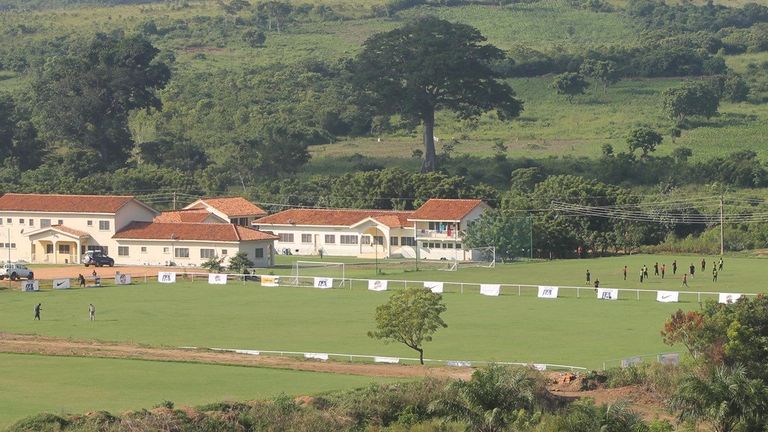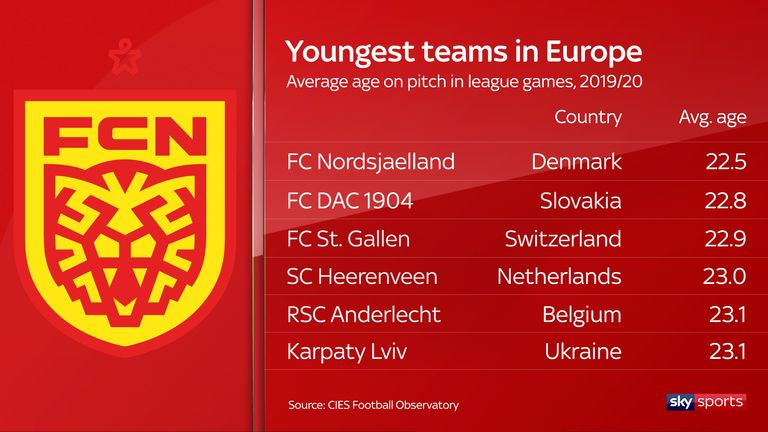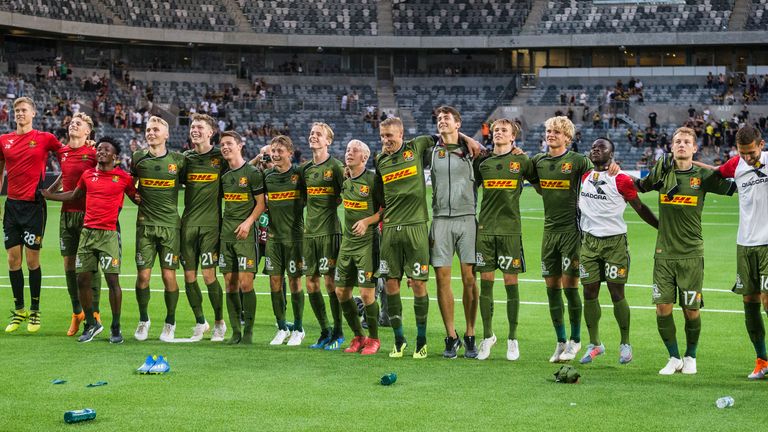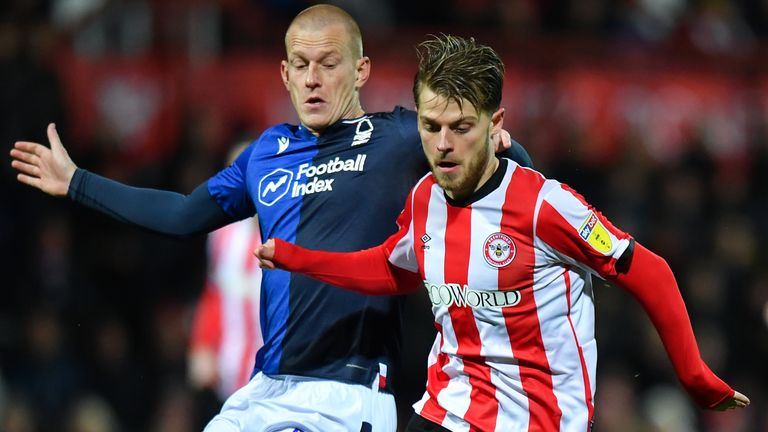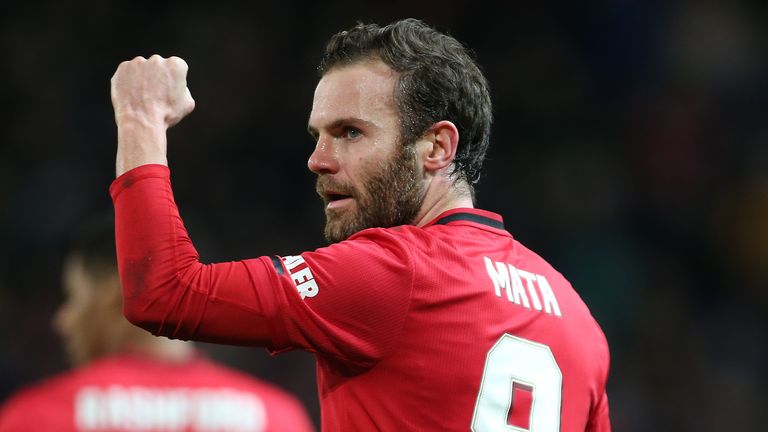FC Nordsjaelland: The Danish club doing it differently with 'youngest team in Europe'
Right to Dream academy in Ghana bought FC Nordsjaelland in 2016 - club now has youngest team across all of Europe's top divisions

Saturday 18 December 2021 18:05, UK
Danish club FC Nordsjaelland are a club proud to do it differently. Before football's lockdown, Sky Sports' Johnny Phillips went to find out how their academy-led approach is paying dividends on and off the pitch.
Twenty years ago, at a disused football stadium in the town of Dawu, in Ghana's Eastern Region, the Right to Dream football academy was founded.
It was the idea of Tom Vernon, an English football coach and Manchester United scout working in the country, who believed that through sport and education children from extreme poverty could have the opportunity to build a better life for themselves.
"At first it was just money from my coaching salary and a few people helping out, but over 20 years we've managed to build Right to Dream into the most respected academy in Ghana," says Vernon, who now has a purpose-built facility housing 90 boys and girls on a residential basis.
It has been an incredible success story. Seven of the players who came through the system have been capped by Ghana.
"We have over 50 graduates who are professional footballers playing around the world, over 70 kids at universities in America, and it is the only girls' academy on the African continent. It's something that a lot of academies in Africa are looking to replicate."
Vernon is speaking from his office overlooking the stadium pitch at FC Nordsjaelland, the Danish Superliga club based in the small town of Farum, just 15 miles north of Copenhagen. Right to Dream bought the club four years ago, with Vernon becoming chairman and overseeing a partnership between the academy in Ghana and FC Nordsjaelland's own youth system.
'We believe in doing it differently'
The results have been eye-catching. FC Nordsjaelland now boasts the youngest team across all of Europe's top divisions, with an average age in league games of 22 years and six months. Sixty per cent of the first team squad is made up of graduates from both academies.
"We are the youngest team in Europe, but we don't want to be the youngest team and be relegated," Vernon explains.
"We have made the Europa League qualifiers in the four years we have been here and we are looking to build on that. The way we have developed players at Right to Dream we think is a globally relevant model. In many ways we think the European academy system has lost its moral compass, the way kids are picked very young and kicked out after a couple of years. Are we really investing in their education?
"We believe in doing it differently. We don't deselect players and we invest heavily in their education and their character development to create people who are fit to go out into the world, whether that's in our first team or not. None of our Ghanaian players come to Europe before our Danish players visit Africa. So all our Under 14s Danish players go to Ghana and spend some time living in the academy like the Right to Dream boys do. There's a lot of knowledge and learning that goes on both ways."
"We are not just focused on winning games in the Superliga, and those results making the day good or bad," says Under 19s coach Kasper Kurland.
"It is a project that goes beyond playing games. The more the players are engaged outside the pitch then the better players they will become. If it is only football each day then we are missing something."
"I'm interested in art, so I don't really spend all my time on football," says Ghanaian midfielder Abu Francis.
"After games, I will go to my room and work on my drawings, which inspires me a lot. If football doesn't go to plan for me, then I know I have other skills that I can use to help myself progress in life."
Players are encouraged to take ownership of their personal development. Creating free-thinking footballers on the pitch is at the heart of the club's DNA.
"Two years ago we were third in the Danish Superliga, and we want to compete in Europe every year and long-term we want to win the Superliga," says head coach Flemming Pedersen.
"Our style of play is an analysis of the modern game at the top level. It is a complex style of play where the players must get used to making fast decisions. They are motivated to get out of their comfort zone. We have a vision where we want a self-organised team: not just 11 players on the pitch but 11 coaches."
Chelsea example, Brentford benefiting
"When you are academy-focused it sends a whole buzz through the club," Vernon adds.
"You've seen it at Chelsea this season with the players they have brought through, it means more. The youngsters come in every day knowing why they are here, they are not disillusioned. We also need to realise good transfer values for our players as that is part of our financing model. We've sold players really well every year."
The impact of the club's youth system is starting to create ripples across Europe, as the club provides a platform for its best players to move on and further their careers.
Brentford, fourth in the Championship, are one of those benefitting with two FC Nordsjaelland graduates currently in their first team - midfielders Emiliano Marcondes and Mathias Jensen.
"They made me a thinker," says Marcondes. "It's the structure and the culture in everything they do. They made it easy to adapt from going from a youth to senior team. The African players have done incredibly well, too. I still follow them now and like to go back home and see how the players from both academies are doing."
"I can't imagine a better club to develop you as a youth player," Jensen agrees. "They give the chance to you if you are performing, no matter how old you are. They develop the players in all the small details of their coaching. They are also focussed on the players as human beings, not just footballers. We had a lot of focus on character sessions, I had a great time there."
'Mata a role model for our players'
The emphasis on character development off the pitch is an integral part of the club's ethos. FC Nordsjaelland has become the first professional club in the world to join Juan Mata's Common Goal project.
"We donate one percent of our stadium turnover," explains chief executive Soren Kristensen. "We signed up on the pitch here with Kasper Schmeichel, who is one of their ambassadors. We also have over 50 players and staff who donate one percent of their salary."
"Mata is the footballer of the future, taking a stand for things, understanding that a 2020 sportsperson has to have a broader perspective," says Vernon. "When you meet Juan he is the kind of player you dream of producing in the academy system: a great player with a broader perspective of what he can give back to others. He engages with us here and we hold him up as a role model for our players.
"Goalkeeper Rúnar Alex Rúnarsson, who we sold to Dijon last year, said his motivation for playing has changed. Now he plays to motivate the kids in the projects he supports through Common Goal.
"Hopefully we are leaving the era of the hyper-individualistic footballer. Many of the negative aspects of social media reinforce individualism but they can also be a platform for sharing your purpose. We have taken a stand on Black History Month, International Women's Day and Common Goal. It's about understanding that you can use these platforms not just to promote yourself. You can stand for something more."
FC Nordsjaelland women's team is another positive story and have enjoyed three successive promotions. They train on the same stadium pitch as their male counterparts.
"The club are trying to give us the same opportunities, we have the same training facilities and the same gym rooms," says midfielder Esther Ronn. "We have almost as many physios, so we feel that we are a valued part of the club."
The path being taken at FC Nordsjaelland is at odds with so much of the modern game in Western Europe. This club is showing it is possible to thrive by taking a different route. And there is a belief that through the promotion of youth and character development, they can make their mark in a distinct way.
At the time of the lockdown, the club stood in fifth place in the Danish Superliga, just two points off third.
"The first team is our oldest academy team," Vernon concludes. "It is younger than many of the Under 23 teams in England. For us, it's about producing people we can be proud of who have come through our system and bought into our philosophy."

